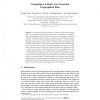Free Online Productivity Tools
i2Speak
i2Symbol
i2OCR
iTex2Img
iWeb2Print
iWeb2Shot
i2Type
iPdf2Split
iPdf2Merge
i2Bopomofo
i2Arabic
i2Style
i2Image
i2PDF
iLatex2Rtf
Sci2ools
121
click to vote
SSD
2007
Springer
2007
Springer
Computing a k -Route over Uncertain Geographical Data
An uncertain geo-spatial dataset is a collection of geo-spatial objects that do not represent accurately real-world entities. Each object has a confidence value indicating how likely it is for the object to be correct. Uncertain data can be the result of operations such as imprecise integration, incorrect update or inexact querying. A k-route, over an uncertain geo-spatial dataset, is a path that travels through the geo-spatial objects, starting at a given location and stopping after visiting k correct objects. A k-route is considered shortest if the expected length of the route is less than or equal to the expected length of any other k-route that starts at the given location. This paper introduces the problem of finding a shortest k-route over an uncertain dataset. Since the problem is a generalization of the traveling salesman problem, it is unlikely to have an efficient solution, i.e., there is no polynomial-time algorithm that solves the problem (unless P=NP). Hence, in this wo...
Related Content
| Added | 09 Jun 2010 |
| Updated | 09 Jun 2010 |
| Type | Conference |
| Year | 2007 |
| Where | SSD |
| Authors | Eliyahu Safra, Yaron Kanza, Nir Dolev, Yehoshua Sagiv, Yerach Doytsher |
Comments (0)

